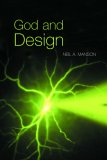This book is a collection of essays by nearly two-dozen different contributors on all sides of the debate about whether the designs of a theistic God are the best explanations for the observations of scientists. The contributors are of the highest quality, including: Michael Behe, William Lane Craig (Does God Exist: The Craig-Flew Debate, and Reasonable Faith: Christian Truth and Apologetics), Paul Davies (About Time: Einstein’s Unfinished Revolution, and The Last Three Minutes), William Dembski, John Leslie (Modern Cosmology and Philosophy, and Universes), Kenneth R. Miller (Finding Darwin’s God), Martin Rees (Before the Beginning), Michael Ruse (Biology and the Foundation of Ethics, and others), Elliott Sober (Unto Others: The Evolution and Psychology of Unselfish Behavior), and Richard Swinburne. With a cast like that, there is a good argument here for everybody.
This book is a major contribution to the ongoing debate over just what the relationship between science and religion ought to be. Some of the authors argue that science proves the truth of their particular religious beliefs, while others argue that science explains everything and does not need anything from religion in order to provide a satisfactory answer. Regardless of your particular view on this topic, you will certainly find something here to support your position.
Ultimately, this might be this book’s greatest failing: it does not really reach any conclusion. It is a collection of very good arguments which are not really specifically pointed at each other. The reader may well ask just why X didn’t address the nuances of the argument given by Y. This book is not in any sense a debate, and the reader is left with greater illumination of the various arguments, but no clear consensus on just where the real truth of the matter lies.
This book is not written in highly technical terms, although (as is typical for a great deal of modern debate between science and religion) a good understanding of modern probability calculations will certainly be helpful to the reader. But even those who lack this sort of background ought to be greatly assisted by the introduction, which explains some of the probability mathmatics used later in the book.
This book comes highly recommended by II co-founder Jeff Lowder. If you are going to debate others on our discussion forums or elsewhere, you need to have a good understanding of both sides of this key debate topic. This book will certainly give you at least that!




